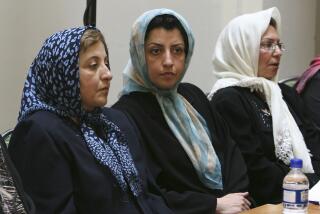Iran Chief Seeks Dialogue in Italy but Offers Little
- Share via
FIESOLE, Italy — Iranian President Mohammad Khatami, aiming to end his country’s isolation, challenged an audience of European scholars Wednesday night to open a “profound, thoughtful dialogue” with the Islamic world. Then he canceled a scheduled question-and-answer session and left the stage.
Khatami’s abrupt exit, which embarrassed his hosts at the European University Institute, appeared to undermine the message of his three-day visit. His departure came after one demonstrator in Rome hit his car with an egg filled with yellow paint and two others gained entry to the institute here, shouting, “Death to Khatami!”
Khatami, a moderate Shiite Muslim cleric, wound up two days of talks with Italian leaders before venturing to this Tuscan hill town overlooking Florence for the keynote address of his state visit--the first trip by an Iranian leader to the West since the Islamic Revolution in 1979. He is due to meet with Pope John Paul II at the Vatican today.
Since Khatami was elected president 22 months ago, one of his main themes has been the need for a “dialogue among civilizations,” code words for bridging the gap between an Islamic government such as Iran’s, which is still subject to U.S. economic sanctions because of its alleged support of terrorism, and secular nations around the world.
Addressing Italy’s Parliament on Tuesday, he said such a dialogue is needed because “big powers” are “turning relations between West and East into a class struggle between oppressors and oppressed . . . creating armed peace, brutality, conflicts and terrorism.”
In his more philosophical lecture here, the 56-year-old cleric said that deeper discussions between European and Islamic thinkers could help.
Drawing on Islamic mysticism, he asserted that each individual has a soulful “Oriental side” inclined toward collectivist ideologies and a more rational “Occidental side” given to liberal individualism. Because man is “a world unto himself,” he said, the two ideologies are not incompatible.
“Islam and Europe must, by force of historical and geographic circumstance, get to know one another better, and then move on to improve their political, cultural and economic relations,” he said.
The 30-minute lecture, filled with references to Eastern and Western philosophers Khatami had read as a seminary student, was delivered to a Pan-European audience including about 150 teachers and students at the postgraduate institute.
But as the scholars stood to applaud the speaker and ready their questions, Khatami’s aides huddled onstage and then informed the institute’s president, Patrick Masterson, that their leader had to hurry back to Rome.
Visibly flustered by the change of plans, Masterson apologized to the audience, thanked Khatami for coming and said it would have been “interesting” to have asked him about human rights. As Khatami smiled and waved goodbye, Masterson explained that the Iranian leader was running late for his next appointment. Then Khatami left the hall with Italian Foreign Minister Lamberto Dini.
“It was a bit embarrassing,” said Yves Meny, a French political scientist who teaches at the institute. “You can’t just say, ‘We need dialogue,’ and then leave like that.”
In fact, the appearance here was Khatami’s last scheduled event of the day. Iranian journalists said his aides may have been alarmed by an Italian security lapse that allowed a man and a woman, Iranian dissidents in exile, to enter the institute’s courtyard 10 minutes apart during Khatami’s visit.
Police removed both demonstrators, and their shouts did not reach the upstairs hall where Khatami was speaking.
Several Iranians with anti-Khatami banners were arrested in Rome earlier Wednesday, a day after about 3,000 Iranian dissidents and some Italian opposition politicians held an authorized, incident-free rally there.
Despite Khatami’s efforts for greater social and political freedom at home, the protesters dismiss him as a facade for a regime that is oppressive, dangerous and unpopular.
“The West is wrong to think it is welcoming a new Gorbachev,” said Behzad Naziri of the Iranian resistance movement, referring to the former Soviet leader credited with opening up his Communist nation. “Khatami is not there to overturn the Islamic Revolution but to prevent it from being swept away.”
But Italian leaders said the visit was well timed to help Khatami, who is battling hard-line conservatives for control of the government, build on moderate candidates’ victories last month in Iran’s first municipal elections in two decades of Islamic rule.
On Wednesday, Khatami and Italian Prime Minister Massimo d’Alema signed agreements to promote Italian investments in Iran, fight drug trafficking and increase scientific and technological exchanges.
The pacts follow a March 1 agreement by the Italian energy group Ente Nazionale Idrocarburi and the French oil company Elf-Aquitaine to invest $1 billion to develop Iran’s Dorood oil field--a deal that dismayed U.S. officials intent on keeping Iran isolated.
The Clinton administration watched cautiously as Italy took the lead last year in seeking political and economic rapprochement between Iran and Europe, and it did not criticize the warm welcome it gave Khatami.
But U.S. State Department spokesman James P. Rubin stressed this week that Iran cannot rejoin the international community without ending what Washington calls its support for terrorism and pursuit of weapons of mass destruction.
Italian officials said they pressed Khatami on both fronts, as well as on Iran’s dismal human rights record.
More to Read
Sign up for Essential California
The most important California stories and recommendations in your inbox every morning.
You may occasionally receive promotional content from the Los Angeles Times.













